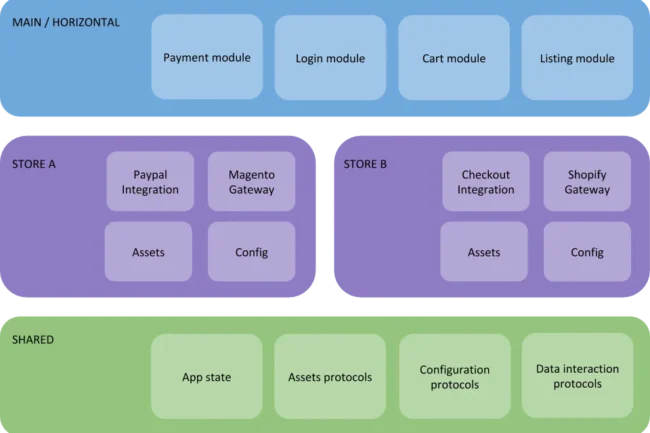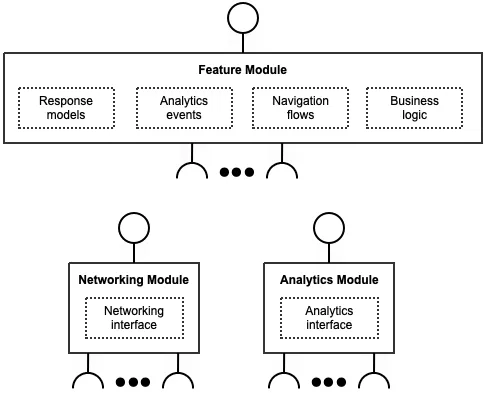In the dynamic world of iOS app development, building scalable and maintainable applications is paramount. A critical aspect of achieving this goal is the practice of modularization. Modularization, as a software design principle, involves breaking down a complex application into smaller, more manageable components, or modules.
Importance In Software Architecture
The importance of modularization in software architecture cannot be overstated. It plays a pivotal role in creating applications that are:
- Scalable: Modularization allows for a more granular approach to software development. This makes it easier to add new features and functionalities, ensuring that the application can grow in line with business requirements.
- Maintainable: Breaking down an application into smaller modules reduces complexity and makes maintenance more straightforward. Developers can focus on individual modules without affecting the rest of the application.
- Testable: Modularization promotes a higher degree of testability. Individual modules can be tested in isolation, which improves the overall quality and reliability of the application.
Modularized ECommerce Platforms

In the realm of ecommerce, modularization is of paramount importance. Ecommerce platforms are complex systems, comprising various functionalities and components. To maintain flexibility, scalability, and ease of maintenance, such platforms often employ modularization strategies.
These strategies include:
- Foundational Modules: These modules contain the core functionalities of the ecommerce platform, such as user management, product catalogs, and order processing.
- Feature Modules: Feature modules encapsulate specific features or functionalities of the platform, such as payment processing, customer reviews, or recommendation engines. This allows teams to work independently on these features and integrate them seamlessly.
- 3rd Party Adapters: Modularization extends to third-party components or integrations. These can be easily adopted and integrated as modules into the ecommerce platform. This approach ensures that the platform remains open to expansion and integrations with external services.
Overheads And Sample Architectures

While modularization offers numerous benefits, it’s essential to acknowledge the potential overheads. Creating modules, managing dependencies, and ensuring proper communication between modules can introduce some complexity. However, the advantages far outweigh these potential issues.
A sample modular architecture for an ecommerce platform may consist of:
- Core Module: This contains the foundational components, such as user authentication, product management, and order processing.
- Feature Modules: Modules for features like payment processing, reviews, and recommendations.
- UI Modules: These modules manage the user interface and interactions, ensuring a clean separation of concerns.
- Third-Party Integrations: These modules integrate with third-party services, allowing the e-commerce platform to connect with external tools, like payment gateways or shipping services.
ECommerce Platform Dependency Tools
In the iOS ecosystem, several tools facilitate modularization:
- CocoaPods: A popular dependency manager for iOS projects. It simplifies the process of adding, updating, and managing external libraries and modules.
- Carthage: A decentralized dependency manager for Swift and Objective-C. It allows developers to declare and manage project dependencies more flexibly.
- Swift Package Manager (SPM): SPM is the official package manager for Swift and is now widely used for modularization in Swift-based projects.
The InRhythm Propel Summit’s iOS Workshop
The InRhythm Propel Summit embodies a commitment to fostering learning, innovation, and excellence in the tech industry. As a part of the summit, the iOS Workshop provides developers with the tools and knowledge needed to build applications that are not just functional but also provide exceptional user experiences. This aligns with the core values of the InRhythm Propel Summit, contributing to the advancement of the tech industry by fostering a community of learners and innovators.
Closing Thoughts
In the ever-evolving landscape of iOS app development, modularization stands as a cornerstone of scalable, maintainable, and high-quality software. In the realm of ecommerce, the application of modularization principles is even more critical. Through foundational, feature, and third-party modules, ecommerce platforms can flexibly expand and integrate external services. While modularization might introduce some overhead, the advantages it brings to the table are indispensable. When applied correctly, modularization can turn an intricate ecommerce platform into a resilient, efficient, and adaptive system.